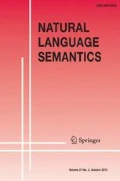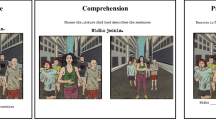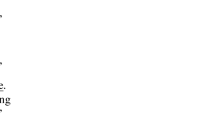Abstract
This paper investigates Negative Concord, arguing that it results from a systematic lexical ambiguity: the items that participate in Negative Concord ("n-words" in Laka's 1990 terminology) are ambiguous between negative polarity items and their genuinely negative counterparts. I try to show that on empirical grounds the proposed account compares favorably with other analyses that shy away from ambiguity. I furthermore suggest that the ambiguity is not implausible conceptually because it can be viewed as reflecting an intermediate stage of the Jespersen Cycle. Negative Concord can be observed in many languages. The data discussed here are taken from Romance, primarily Spanish.
Similar content being viewed by others
REFERENCES
Barker, Laura and Elena Herburger: 2000, ‘Even Even Can Be an NPI: Evidence from Spanish’, manuscript, Georgetown University.
Bosque, Ignacio: 1980, Sobre la Negación, Cátedra, Madrid.
Bosque, Ignacio: 1992, ‘La Negación y el Principio de las Categorías Vacías’, manuscript, Universidad Complutense de Madrid, Spain.
Carlson, Greg: 1980, ‘Polarity Sensitive Any Is Existential’, Linguistic Inquiry 12, 799–809.
Déprez, Viviane: 1997, ‘Two Types of Negative Concord’, Probus 9, 103–143.
Déprez, Viviane: 2000, ‘Parallel (A)symmetries and the Internal Structure of N–words’, Natural Language and Linguistic Theory 18, 253–342.
Fauconnier, Gilles: 1975: ‘Pragmatic Scales and Logical Structures’, Linguistic Inquiry 6, 353–357.
Heim, Irene: 1984, ‘A Note on Negative Polarity Items and Downward Entailingness’, Proceedings from NELS 14, pp. 98–107. GLSA, University of Massachussetts at Amherst.
Herburger, Elena: 1998, ‘Spanish N–words: Ambivalent Behavior or Ambivalent Nature?’, in U. Sauerland and O. Percus (eds.), The Interpretive Tract (MIT Working Papers in Linguistics 25) pp. 86–102. MIT, Cambridge, Mass.
Herburger, Elena: 2000, What Counts: Focus and Quantification, MIT Press, Cambridge, Mass.
Horn, Laurence: 1989, A Natural History of Negation, The University of Chicago Press, Chicago and London.
Horn, Laurence: to appear, ‘ANY and (–) EVER, Free Choice and Free Relatives’, to appear in the Proceedings of the Fifteenth Annual Conference of the Israeli Association for Theoretical Linguistics, 1999.
Jespersen, Otto: 1917, Negation in English and Other Languages, A.F. Høst, Copenhagen.
Labov, Williams: 1972, ‘Negative Attraction and Negative Concord’, Language 46, 773–818.
Ladusaw, William: 1979, ‘Polarity Sensitivity as Inherent Scope Relations’, PhD dissertation, University of Texas. Published in 1980 by Garland, New York.
Ladusaw, William: 1992, ‘Expressing Negation’, in C. Barker and D. Dowty (eds.), Proceedings of SALT 2, pp. 237–259. The Ohio State University, Columbus.
Ladusaw, William: 1993, ‘Negation, Indefinites, and the Jespersen Cycle’, in J. Guenter, B. Kaiser and C. Zall (eds.), Proceedings of BLS 19, pp. 437–446. Berkeley Linguistics Society, Berkeley.
Lahiri, Utpal: 1998, 'Focus and Negative Polarity in Hindi, Natural Language Semantics 6, 57–123.
Laka, Itziar: 1990, ‘Negation in Syntax: On the Nature of Functional Categories and Projections’, PhD dissertation, MIT. Published in 1994 by Garland, New York.
Lee, Yun Sook and Laurence Horn: 1994, ‘Any as Indefinite plus Even’, manuscript, Yale University.
Linebarger, Marcia: 1987, ‘Negative Polarity and Grammatical Representation’, Linguistics and Philosophy 10, 186–195.
Longobardi, Giuseppe: 1991, ‘Island Effects and Parasite Constructions’, in J.–T. Huang and R. May (eds.), Logical Structure and Linguistic Structure, pp. 149–196. Kluwer, Dordrecht.
Martin, Ana Maria: 2000, ‘Polarity Items in Romance: Underspecification and Lexical Change’, in S. Pintzuk, G. Tsoulas, and A. Warner (eds.), Diachronic Syntax: Models and Mechanisms, pp. 191–219. Oxford University Press, Oxford.
Posner, Rebecca: 1984, ‘Double Negatives, Negative Polarity and Negative Incorporation in Romance: A Historical and Comparative View’, Transactions of the Philological Society 1984, pp. 1–26.
Progovac, Ljiljana: 1988. ‘A Binding Approach to Polarity Sensitivity’, PhD dissertation, University of Southern California.
Rooth, Mats: 1985, ‘Association with Focus’, PhD dissertation, University of Massachusetts at Amherst.
Rullmann, Hotze: 1997, ‘Even, Polarity and Scope’, manuscript, University of Alberta.
Suñer, Margarita: 1995, ‘Negative Elements, Island Effects and Resumptive No’, The Linguistic Review 12, 233–373.
Uribe–Etxebarría, Myriam: 1994, ‘Interface Licensing Conditions on Negative Polarity Items: A Theory of Polarity and Tense Interactions’, PhD dissertation, University of Connecticut, Storrs.
Vallduví, Enric: 1994, ‘Polarity Items, N–words, and Minimizers in Catalan and Spanish’, Probus 6, 263–294.
Van der Wouden, Ton and Frans Zwarts: 1993, ‘A Semantic Analysis of Negative Concord,’ in U. Lahiri and A. Wyner (eds.), Proceedings of SALT 3, pp. 202–219. Cornell University, Ithaca, N.Y.
Van der Wouden, Ton: 1997, Negative Contexts: Collocation, Polarity and Multiple Negation, Routledge, London and New York.
Zanuttini, Raffaella: 1991, ‘Syntactic Properties of Sentential Negation: A Comparative Study of Romance Languages’, PhD dissertation, University of Pennsylvania.
Zanuttini, Raffaella: 1997, Negation and Clausal Structure: A Comparative Study of Romance Languages, Oxford University Press, New York.
Zubizarreta, María Luisa: 1998, Focus, Prosody and Word Order, MIT Press, Cambridge, Mass.
Author information
Authors and Affiliations
Rights and permissions
About this article
Cite this article
Herburger, E. The Negative Concord Puzzle Revisited. Natural Language Semantics 9, 289–333 (2001). https://doi.org/10.1023/A:1014205526722
Issue Date:
DOI: https://doi.org/10.1023/A:1014205526722




